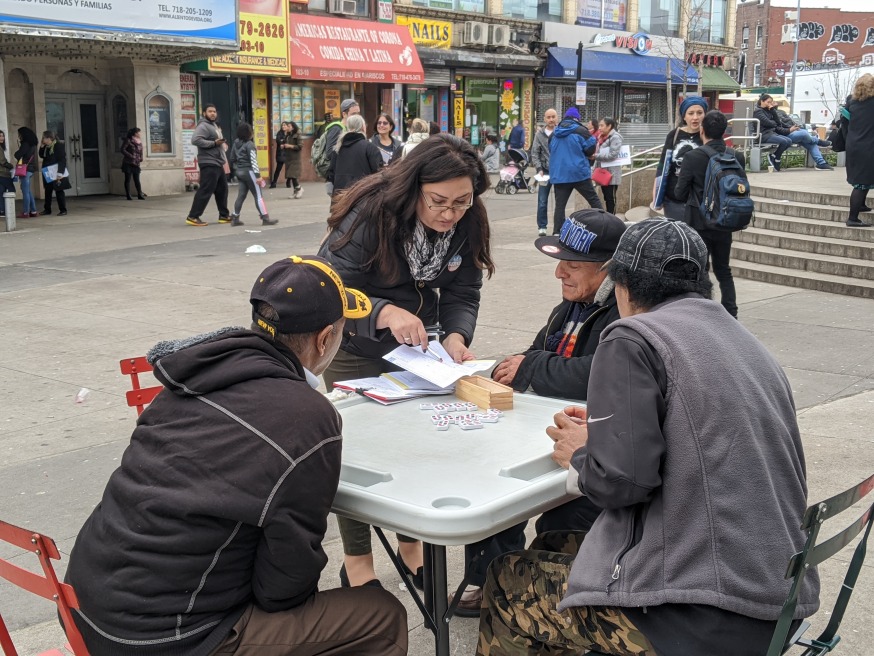
Ingrid Gomez speaking to community members in Corona (Photo courtesy of Gomez For Queens)
May 14, 2021 Op-Ed By Ingrid Gomez
In the wake of the pandemic, our communities need housing more than ever.
Yet many tend to overlook the most obvious method in addressing the rise in homelessness in our city, and that’s ensuring people currently living in homes are allowed to continue living in them.
Rent spikes, abusive landlords, property tax liens, and out-of-touch development projects all contribute to the housing crisis and disproportionately affect communities of color.
I’ve lived in Corona for the past 15 years and worked as a social worker for the past 7, and I’ve witnessed too many families struggle with housing time after time, working-class, majority immigrant families like mine, fighting eviction after eviction.
I’m running for City Council in the 21st District with Housing for All at the forefront of our mission. After a longstanding neglect, it’s time to fight for the people of this district, not real estate landlords, big developers or special interests.
The 21st Council District has failed to provide us with dignified, safe, accessible and affordable housing long before the pandemic. According to the Department of Homeless Services, nearly 20 percent of Queens residents resorted to homeless shelters back in 2019.
Yet while we longed for housing stability these past years, our current Councilmember was focused on setting aside 17 acres of public land for a soccer stadium at Willets Point. We need to shift City Council priorities back to housing accessibility. I will reject profit-focused development projects that only benefit real estate companies and investors, not the people of this district.
Instead, I will work with City Council to create more affordable housing through several nonprofit initiatives, like social housing and community land trusts (CLTs) that actually benefit the people of this district, not the rich. Projects like Social Housing and CLTs are community-controlled nonprofits that ensure land is used to provide permanently-affordable housing and meet other critical community needs. Through non-profit properties, we can help preserve affordable housing in our communities and protect tenants from evictions.

City Council Candidate Ingrid Gomez (Photo Courtesy of Gomez for Queens )
I will also work with City Council to begin turning vacant commercial spaces, office buildings and hotels into permanent affordable housing. Post-pandemic vacancies are soaring and we need to use this opportunity to obtain these properties and transfer them to nonprofit institutions like CLT’s.
It’s also time to begin converting and legalizing basement apartments throughout Queens. Most who seek housing in our basements are People of Color and working-class immigrants. Queens is home to over 1 million immigrants in need of safe and legal basement apartments. The New York Times estimates that there are tens of thousands of dangerous and illegal basement apartments in Queens currently housing our immigrant community.
Our campaign will push to fully legalize basement apartments through conversion programs that lift certain basement regulations and provide homeowners with financial assistance, in the form of grants and loans, for safety renovations needed to rent out their basements.
According to an independent study by Citizens Housing & Planning Council, Queens has the second greatest supply of potential basement apartments in New York City, with approximately 11,400 units.
Neighborhoods in my district, like East Elmhurst and Jackson Heights are rich with single-family homes with basements. Safe and adequate basement apartments are an untapped resource in helping thousands of our most vulnerable residents find an affordable and safe place to live.
With homeowners having failed to meet basement renting regulations, the City basement requirements have left thousands of potential basements in Queens completely unoccupied, with many of our most vulnerable residents resorting to living instead in dark, dangerous basements and cellars.
With some of the highest rates of foreclosure in the city, basement apartments would help stabilize some monthly income for a lot of our homeowners.
Rental assistance programs are also in need of massive improvement. CityFHEPS, which helps families move out of homeless shelters and transition into permanent housing by providing rent vouchers, is currently issuing vouchers that are way below the market rate in New York City. This makes it extremely challenging and sometimes impossible for anyone in the program to find safe and adequate housing.
The maximum rent that CityFHEPS provides for a two bedroom is currently at $1,557 per month. The federal Section 8 program currently provides a $2,217 subsidy for a two-bedroom apartment. There is a proposed bill in City Council that still hasn’t been passed, Intro 146, which will raise monthly vouchers to a fair market price, an increase of over 500 dollars per household.
I will push to abolish the Major Capital Improvement Program (MCI), which has allowed landlords to pass along the costs of repairs to tenants through rent increases. The program is often abused and pushes low income New Yorkers out of their homes through unpredictable rent hikes while landlords profit. A recent analysis by Housing Justice for All found that 70 percent of MCI applications were by wealthier landlords of more than 150 units. Building maintenance and repairs are ultimately a landlord’s responsibility.
We will work to abolish property tax lien sales, the practice of selling a homeowner’s tax debt to private entities, which has disproportionately drained wealth from our already neglected communities, many of which still suffer the consequences of historic inequities like redlining and disinvestment. Tax lien sales have also created a loophole for countless evictions throughout our neighborhoods during the pandemic.
By abolishing tax lien sales, we can develop alternative systems of tax collection and property disposition through community land trusts. This strategy would advance numerous housing goals, but most importantly, it will help prevent wrongful and unnecessary evictions of vulnerable home-owners.
Our vision also sets sights on reviving growth and stability back into the core of our communities, our small businesses, which have taken a massive hit since the pandemic began. We will back the Small Business Jobs Survival Act (SBJA) to help protect small business owners and their commercial spaces from evictions, excessive rent prices and abusive landlord tactics.
We will push for regulations that safeguard commercial tenants and their businesses, like minimum 10-year leases, right to renewal and fair negotiation terms.
We will back universal rent control to protect our most vulnerable tenants from rent spikes and evictions. It’s time to put an end to greediness and finally begin protecting our communities from homelessness.
Ingrid Gomez is a candidate for New York City Council in District 21 in Queens. The district covers Corona, East Elmhurst, LeFrak City, Elmhurst and Jackson Heights.






